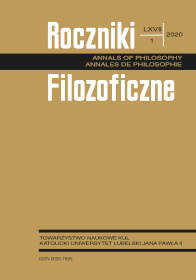The Philosopher as the Therapist: A Lesson from the Past
Abstract
This article is about the philosopher as a potential therapist. It starts from tendencies exhibited by a group of contemporary philosophers involved in a so-called human enhancement. Drawing on the newest discoveries of genetics, genetic engineering and pharmacology, they offer a set of therapies aimed at the extensive ‘improvement’ of the human condition. In the second part of the paper, selected ideas concerning philosophical therapy by the Ancient philosophers are presented. They basically employed personal contact, conversation, and wise counselling. Then these two approaches to this kind of therapy are compared and contrasted. The contemporary approaches offer novel, technical ways of intervention but are blind as far as far-reaching goals and the essential goods of human life are concerned. Despite serious cultural differences, the contemporary therapy can learn a lot from the ancients. If the human being is to be treated by philosophers, an integral picture of who the former is must be taken into account. This means that both his interiority and exteriority should be subjects to the therapy.
References
Agar, Nicholas. Humanity’s End. Why Should We Reject Radical Enhancement. Cambridge, MA, London: The MIT Press, 2010.
Agar, Nicholas. Truly Human Enhancement. A Philosophical Defence of Limits. Cambridge, MA, London: The MIT Press, 2014.
Allhoff, Fritz, Patrick Lin, and Jesse Steinberg. “Ethics of Human Enhancement: An Executive Summary.” Science and Engineering Ethics 17 (2011): 201–212.
Annas, Julia E. “Philosophical Therapy, Ancient and Modern.” In Bioethics. Ancient Themes in Contemporary Issues, edited by Mark G. Kuczewski and Ronald Polansky, 109–127. Cambridge, MA, London: A Bradford Book of MIT Press, 2002.
Aristotle, De Anima. Translated by C.D.C. Reeve. Indianapolis: Hackett Publishing Company, 2017.
Aristotle, Protrepticus, edited by Anton-Hermann Chroust. Notre Dame: University of Notre Dame Press, 1964).
Bostrom, Nick. Savulescu, Julian. “Human Enhancement Ethics: The State of the Debate.” In Human Enhancement, edited by Julian Savulescu and Nick Bostrom, 1–22. Oxford: Oxford University Press, 2009.
Bostrom, Nick. Superintelligence. Paths, Dangers, Strategies. Oxford: Oxford University Press, 2014.
Cohen, Elliot D. Theory and Practice of Logic-based Therapy: Integrating Critical Thinking and Philosophy into Psychotherapy, Newcastle upon Tyne: Cambridge Scholars Publishing, 2013.
Delsol, Chantal. La Haine du Monde. Totalitarismes et postmodernité. Paris: Les Editions du Cerf, 2016.
Democritus. In The Older Sophists. Frag. B 31. In Julia E. Annas. “Philosophical Therapy, Ancient and Modern.” In Bioethics. Ancient Themes in Contemporary Issues, edited by Mark G. Kuczewski and Ronald Polansky. Cambridge, MA, London: A Bradford Book of MIT Press, 2002.
Frankl, Victor. Man’s Search for Meaning. An Introduction to Logotherapy, Boston, MA: Beacon Press, 2006.
Galen. “The On the Views of Hippocrates and Plato.” In Julian E. Annas. “Philosophical Therapy, Ancient and Modern.” In Bioethics. Ancient Themes in Contemporary Issues, edited by Mark G. Kuczewski and Ronald Polansky. Cambridge, MA, London: A Bradford Book of MIT Press, 2002.
Hadot, Pierre. Philosophy as a Way of Life. Spiritual Exercises from Socrates to Foucault. Translated by Michael Chase, edited by Arnold I. Davidson. Oxford: Blackwell Publishers Ltd, 1995.
Harris, John. Enhancing Evolution. The Ethical Case for Making Better People. Princeton, London: Princeton University Press, 2007.
Harris, John. How to Be Good. The Possibility of Moral Enhancement, Oxford: Oxford University Press, 2016.
Hauskeller, Michael. Better Humans? Understanding the Enhancement Project. Durham: Acumen, 2013.
Kurzweil, Ray. The Singularity Is Near: When Humans Transcend Biology. London: Penguin Books, London, 2006.
Maslow, Abraham H. Toward a Psychology of Being. Floyd, VA: Sublime Books, 2014.
Nussbaum, Martha. The Therapy of Desire. Theory and Practice in Hellenistic Ethics. Princeton, London: Princeton University Press, 1994.
Parens, Erick. “Toward a More Fruitful Debate about Enhancement.” In Human Enhancement, edited by Julian Savulescu and Nick Bostrom, 181–197. Oxford: Oxford University Press, 2009.
Persson, Igmar, and Julian Savulescu. Unfit for the Future. The Need for Moral Enhancement, Oxford: Oxford University Press, 2012.
Plato, Charmides. Translated by Thomas G. West and Grace Starry West. Indianapolis: Hackett Publishing Company, 1986.
Reale, Giovanni. Saggezza antica. Terapia per i mali dell’uomo d’oggi. Milano: Raffaelo Cortina Editore, 1995.
Sauvé Meyer, Susan. Ancient Ethics. A Critical Introduction. London. New York: Routledge, 2008.
Savulescu, Julian, Anders Sandberg, and Guy Kahane. “Well-Being and Enhancement.” In Enhancing Human Capacieties, edited by Julian Savulescu, Ruud ter Meulen, and Guy Kahane, 3–18. Malden, Oxford: Wiley-Blackwell, 2011.
Sorabji, Richard. “Body and Soul in Aristotle.” Philosophy 49 (1974), 187: 63–89.
Spaemann, Robert. Persons. The Difference between ‘Someone’ and ‘Something.’ Translated by Oliver O’Donovan. Oxford: Oxford University Press, 1996.
Copyright (c) 2020 Roczniki Filozoficzne

This work is licensed under a Creative Commons Attribution-NonCommercial-NoDerivatives 4.0 International License.





